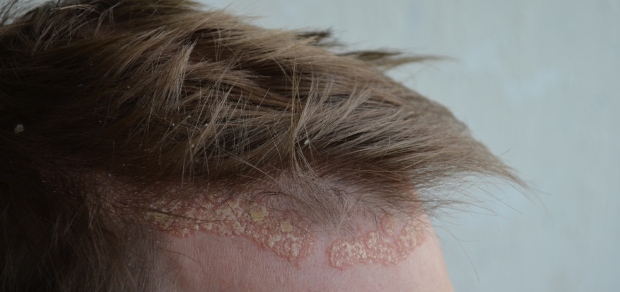
A Guide to Living with Scalp Psoriasis
If you’ve been diagnosed with scalp psoriasis, you know that some people try to draw a connection to dandruff, but it’s not at all the same. Not only is scalp psoriasis a chronic condition—meaning it tends to linger while dandruff usually comes and goes—it also causes the shedding of skin scales instead of flakes, and it can be red and painful to the touch. You need information and advice that goes beyond using a special shampoo. Here’s a full rundown of what people with scalp psoriasis should know about living with the condition and its unique set of challenges.
What’s Different About Scalp Psoriasis?
“Scalp psoriasis can be itchy, painful and cause dandruff-like flaking,” says Rhonda Klein, M.D., a board-certified dermatologist at Modern Dermatology of Connecticut in Westport. “It can be aesthetically and emotionally upsetting to patients.”
What sets scalp psoriasis apart from other scalp conditions—like seborrheic dermatitis (a type of eczema)—is the appearance of the impacted skin: powdery and with a silvery sheen, says the National Psoriasis Foundation.
“As a condition, scalp psoriasis doesn’t differ all that much from psoriasis that occurs at other locations [of the body],” says board-certified dermatologist Sourab Choudhury, D.O., of The Dermatology Specialists. “However, scalp psoriasis can be more challenging to treat with topical medication because of the amount of hair that patients tend to have on their scalp.”
The American Academy of Dermatology says that a diagnosis of scalp psoriasis is typically made with a simple examination of the scalp by a dermatologist. Occasionally, they say, the dermatologist will take a skin sample to be sent to a lab for confirmation.
How Common is Scalp Psoriasis?
For people who already have psoriasis, Choudhury says scalp psoriasis is a pretty common presentation of the condition. “Research has indicated that of those who have psoriasis, 80 percent will experience the condition on the scalp,” he says.
The National Psoriasis Foundation breaks scalp psoriasis down into two levels: mild and severe. With mild psoriasis, they say, patients experience fine scaling on their scalps. In more severe presentations of the condition, “thick, crusted plaques” may appear over large areas of the head, even sometimes moving beyond the hairline and impacting the forehead and neck.
Who Gets Scalp Psoriasis?
“Scalp psoriasis doesn’t discriminate,” Choudhury says. “It will affect patients of all genders, races, and ages.” The condition typically shows up for the first time at some point between the ages of 15 and 35, he says.
Like all forms of psoriasis, the cause of scalp psoriasis isn’t fully known—though it is likely caused by a combination of genetics and environmental factors.
What Are My Treatment Options?
Scalp psoriasis is often difficult to treat, and patients may need to try a few different options before finding the right treatment protocol for them.
For mild cases, treatment may begin with OTC products. “Over-the-counter psoriasis shampoos and topical medications are widely available in most pharmacies,” Choudhury says.
“I like Free & Clear Shampoo for my patients with scalp psoriasis,” says Klein.
“Depending on the severity of the case, doctors may also suggest topical steroids, Vitamin D foams, light treatments, or Kenalog injections,” continues Choudhury. “The most extreme cases might call for biologic medication.”
What Can I Do at Home to Get the Best Results?
If you’re using topical products for treatment, the National Psoriasis Foundation suggests attempting to soften and remove the plaques (in a safe manner, of course) prior to applying your topical treatment, so that the topical has a better chance of breaking through the outer skin layers. To do this, soak your head in warm (not hot) water and apply moisturizers to your scalp afterward, while it’s still damp.
“With scalp psoriasis, you need to take extra time to part the hair and apply a topical medication to the underlying skin,” Choudhury explains. Then you can gently comb your hair to help remove softened plaques.
“It’s not a bad idea to keep a bottle of over-the-counter psoriasis shampoo on hand in case you need it,” says Choudhury. Some of these medicated shampoos also contain menthol, which can help to reduce any itching you may be experiencing as a result of scalp psoriasis.
“Soaking your whole body, including the affected part of your head, in warm water with Epsom salts may reduce discomfort and help loosen plaques of scalp psoriasis,” Klein says.
Will My Hair Fall Out?
It is not uncommon for scalp psoriasis to cause hair loss, as the skin lesions can sometimes damage the hair shaft and follicle, according to the National Psoriasis Foundation. This damage can also occur as a result of scratching at the psoriasis, and sometimes from the chemicals in products used to treat scalp psoriasis.
While hair loss can be distressing, it’s likely not permanent. The first priority needs to be getting the condition under control. For most patients, normal hair growth will resume once the presentation of scalp psoriasis has gone down.
How Can I Prevent Flares?
Once you have your scalp psoriasis under control, you’ll want to work to prevent further flares. “Stress and changes in the weather can often trigger psoriasis, so I would advise keeping your stress levels down and using a humidifier to modulate your at-home environment,” says Choudhury. “It can help to use the [medicated] shampoo once or twice per week as a preventive measure.”
Like all forms of psoriasis, dealing with scalp psoriasis can be frustrating and as emotionally impactful as it is physically. But this is one form of psoriasis with a lot of options for treatment. Talk to your dermatologist and find the best strategy for defeating your scalp psoriasis today.
You May Also Like:
Want to Read More?
Access all of Twill Care’s content, community, and experts for free!
Already a member? Login
Want to Read More?
Access all of Twill Care’s content, community, and experts for free!
sign UP For FreeAlready a member? Login

